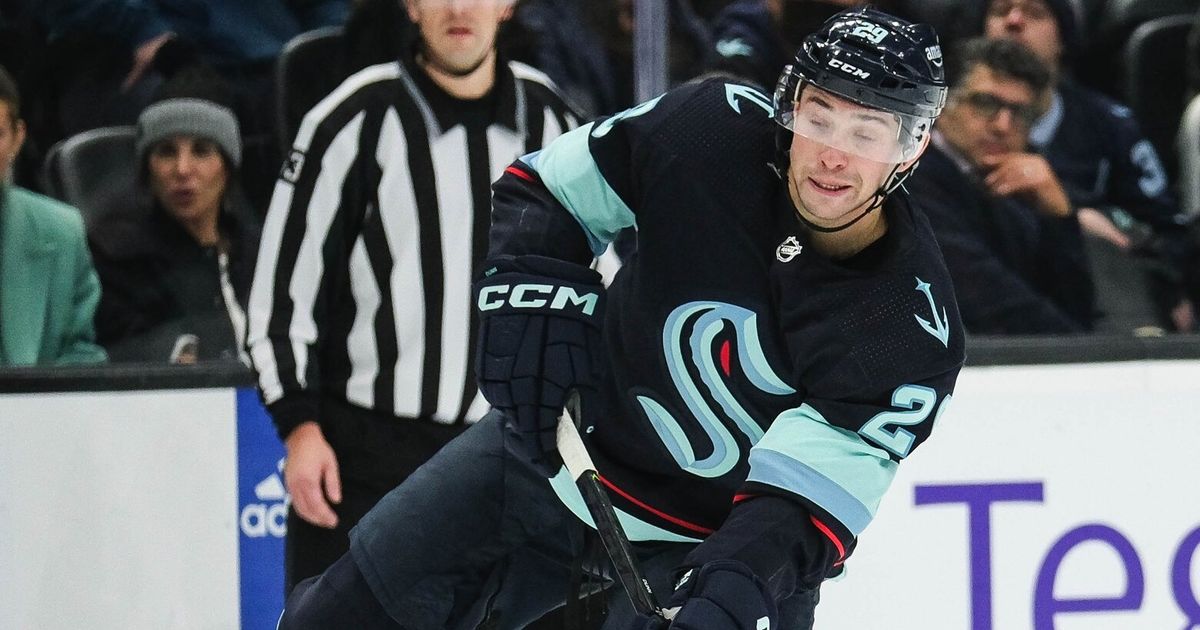
The sight of forwards Jared McCann and Alex Wennberg blocking shots while short-handed toward the end of Wednesday’s blowout victory signified the Kraken’s renewed commitment to their penalty killing.
That group of special-teams defenders had previously stood out in stark contrast to the rest of a Kraken squad that began Thursday once again atop the Pacific Division. While the Kraken were tied for most NHL victories this month at 10, had the highest points total at 21, goals at 55 and goals per game at 4.23, the penalty-kill until recently ranked in the league’s basement.
But they’ve now managed five consecutive games without giving up a power-play goal, going 13 for 13 against some of the league’s most explosive teams.
“I think it’s guys working as a team, all four guys on the ice,” Kraken defenseman Jamie Oleksiak said. “And putting pressure on other teams — not letting them get as set up as they want. I think that’s been a key for us.”
The Vancouver Canucks went 0 for 5 on the power play in the Kraken’s 6-1 victory Wednesday, the biggest kill coming late in the first period with the home side up 2-0. It would be the Kraken getting the best scoring chance while short-handed, with Brandon Tanev stopped on a breakaway just 45 seconds into the Canucks’ power play and drawing a tripping penalty that negated the rest of Vancouver’s man advantage.
The shot-blocking by McCann and Wennberg came with their team already up five goals in the game’s waning minutes. Blocking shots can leave players sore or even injured after a game, so the Kraken doing it with a big lead exemplified their commitment to getting things right on special teams.
Only the Washington Capitals and St. Louis Blues have also gone perfect on the penalty kill since the Kraken’s streak began Jan. 16. And the Kraken penalty killers haven’t cherry picked their opponents, blanking power-play units that included No. 1 Edmonton, No. 3 Tampa Bay and No. 7 Colorado during that stretch.
The Kraken enter Friday night’s game against the Calgary Flames at Climate Pledge Arena with a 28-14-5 record and knowing a Saturday contest looms against a Columbus Blue Jackets team with the league’s worst record. Sweeping both home games and potentially heading into the All Star Break alone in first place is the goal, though the Flames had won four of their past six entering a Thursday matchup against Chicago and were creeping up the division standings.
“We’re not too high, not too low,” Oleksiak said. “I think that speaks to the leadership group we have here. Obviously, we went on that win streak before and then went on kind of a bit of a losing streak. And I think we kind of learned from that.
“We learned we can’t rely on talent and luck and whatnot. We just have to rely on our game, stick to the system and everybody will kind of prosper from that.”
The penalty-kill units have also relied largely on sticking to a simpler system, forcing opposing power-play units into making quick decisions and then clearing the puck out of the zone when given a chance.
Oleksiak has been paired with defenseman Adam Larsson on the primary penalty-kill unit with forwards McCann and Yanni Gourde.
“We’ve done a real good job in terms of the structure in our zone but also finding the right opportunities to pressure [opposing puck carriers],” Kraken coach Dave Hakstol said after the win over Vancouver. “It’s funny, when you do things the right way like we did tonight — you look at the shot-blocks in the last few penalty kills — that tells you the commitment level. And it’s not a coincidence that when you do things the right way you get a break or two as well.”
One of those came when Canucks center Bo Horvat missed on an open-net chance. Beyond that, there wasn’t much to blame on the Kraken penalty killers. The perfect mark the past five games raised the Kraken’s penalty-killing proficiency to 71.53% — still second-worst in the league ahead of Vancouver but just a few percentage points from mid-tier status.
Kraken defenseman Vince Dunn noted after the Vancouver contest that the power play also registered a couple of goals. Dunn said the penalty kill has relied more on instinct than it had previously, taking away high-end opportunities when possible and depending on goaltenders to make saves on chances from farther out.
“Special teams were great,” he said. “That’s really important, especially in the second half. It’s something that we really harp on. Those are the situations we need to be good in to win games.”